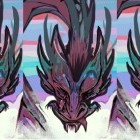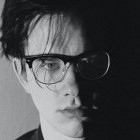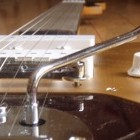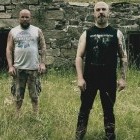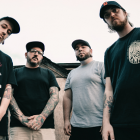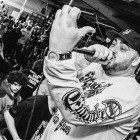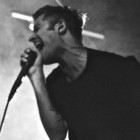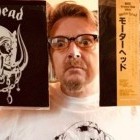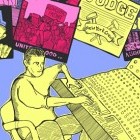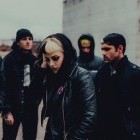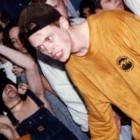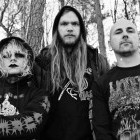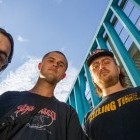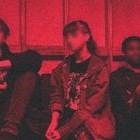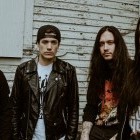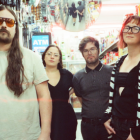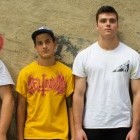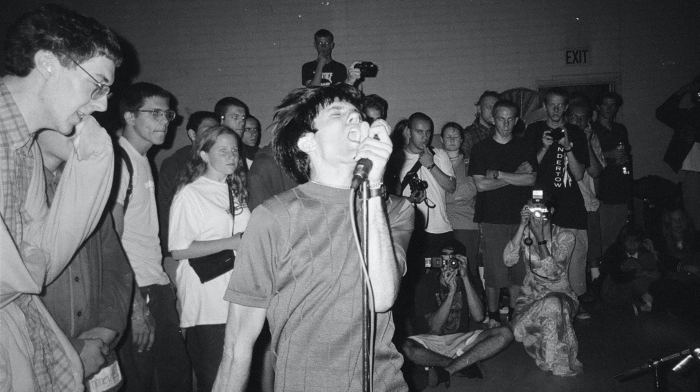
Over the course of a few years in the mid-'90s, Swing Kids waved the flag for weirdo hardcore punk.
Comprised of singer Justin Pearson (Struggle, The Locust, Dead Cross, Retox), bassist John Brady (Sweep the Leg Johnny, Agonista), drummer Jose Palafox (Bread and Circuits, Yaphet Kotto, Baader Brains), and guitarist Eric Allen (Struggle, Unbroken), the group came out of Diego with a sound that was jagged, dissonant, and always had the feeling like it all could fall apart at any second.
Next month, Pearson's Three One G label will be reissuing a remastered version of Swing Kids' Anthology album. The new release will include the band's eponymous 7 inch, recorded during around the time of their 2011 reunion charity shows in honor of their late guitarist, Eric Allen, who died in 1997.
No Echo spoke with Pearson about Swing Kids' aesthetic, the way they were received by the hardcore community, and which of their songs he feels best captures their sonic legacy.
Speaking as someone who was around when Swing Kids first came out, it felt like the band emerged fully formed in the sense that you had a sound, visual aesthetic, and lyrical point of view that was already dialed in. Thinking back, do you see it that way?
It’s odd to think about life for me back then. A year seemed like forever. But after you have lived more than forty of those, Parts of the past do seem to be a bit more brief than when I was actually living them. But there was a definite transition from what Eric Allen, Jose Palafox, and I were doing previously, in Struggle, which was our first band. A lot seemed to happen to us, which all tied into the result of what Swing Kids ended up being.
Part of us was just over playing metal music and wanted to do something a bit faster, and maybe not as sonically pleasing as far as chords and so on. Eric was a brilliant guitarist, even considering the fact that he was ultimately taking too many cues from John Reis and his playing. However, I think Eric, had reference points that were submerged in crust, anarcho-punk, straight edge hardcore, and death metal. So his John Reis influence was bound to be disguised a bit.
We were also up against what was seeming to be this overly conservative and fairly elitist music scene, which we were all associated with. Ebullition Records had released all of the Struggle material, and I think by default, Struggle, and Eric’s other band, Unbroken, were accepted in that scene. But being from San Diego, we were able to have a variety of influences, and accept different and new things.
What do you remember the reaction being like from the underground music scene at the time?
I specifically remember HeartattaCk publishing an article about our friends, Antioch Arrow, and criticized them for not being a certain way, and putting too much emphasis on how they looked, and that the lyrics had no meaning.
Oddly enough, that first Antioch Arrow album changed my life in a serious way. Yes, I was over playing in a metal band and talking about how I hated cops as a teenager. I mean, I have always hated cops, and still do to this day. I probably hate cops more so than I ever have in my life right now, and with much more of an understanding of the racist police system. But I didn’t need to play in a band that sang about it to what seemed to be privileged stuck up white kids.
Perhaps Antioch Arrow and their friends were also partially privileged stuck up white kids in some way as well, but they found out how to reinvent something, or recreate something that was becoming mundane. With all that being said, you can swap out a Mohawk for greasy black hair and still be a punk.
Either way, our jeans were already tight, and our attitudes were pretty bad. The good kind of bad. Plus, I was taking my influences from bands like the Birthday Party and the Cramps. Either way, I was bound to bum out my mom, make average folks on the street stare at me, and end up getting beat up by the same sort of dicks that I would encounter.
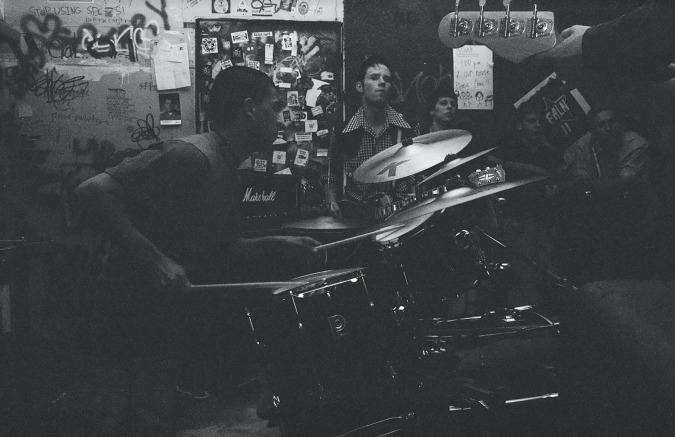
But there was one incident that really stuck out for me. Struggle played this show in Riverside, California with Strife. It was outside and we agreed to play because Downcast was on the bill and we were told that Rorschach were going to play as well, and if my memory serves me right neither of those bands played.
We were sort of over it by the time we arrived and could tell that nobody would give a shit about us playing anyhow. We were essentially playing to jocks and people who we could not relate to.
For various reasons, I had a megaphone that I would bring around with me, often to fuck with people, like Mormons riding bikes, or driving though Navy housing areas in San Diego telling people washing their cars that the communists were coming.
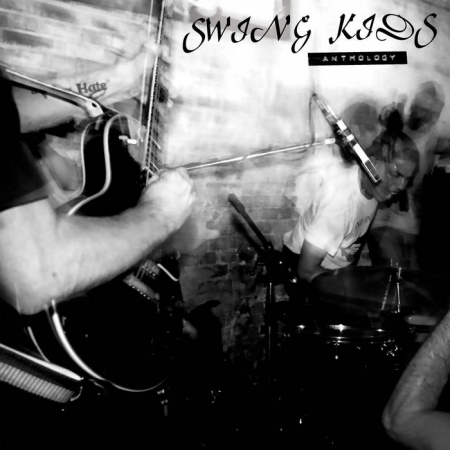
Anyhow, Jose grabbed the megaphone during Strife’s set and from the back of the lot where the show was taking place proceeded to say, “This is the San Diego Police Department, you are unauthorized to play music and that this is an official noise complaint," and that was it.
He didn’t say to stop, and certainly did not look like a pig. But Strife stopped playing. And didn’t start again. They didn’t even check to see if it was real, if the pigs split, nothing. Just stopped and the show was over. Most important point of what Jose said to them was that he was the San Diego Police Department, not Riverside Police, which was about two hours away from each other.
Also the fact that there were four people from San Diego at the show, and those four people were in Struggle. Nonetheless, it also made us realize that some of the bands we were associating with were kinda lame. I always loved Downcast and Rorschach, and still do listen to them to this day. Strife, I could not give a shit about. Never have, and I assume I never will.
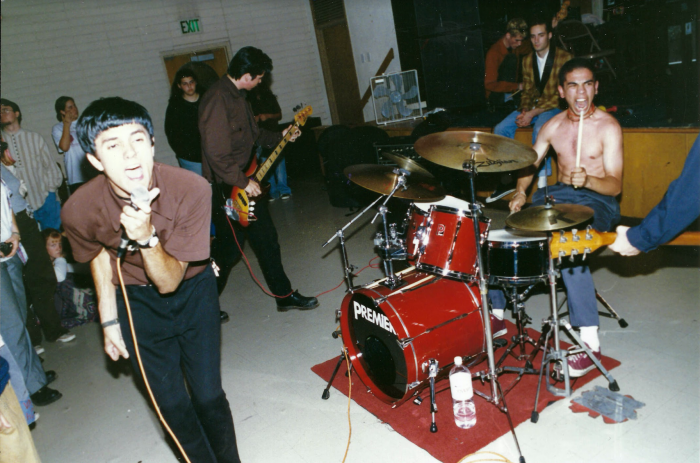
What happened next?
Soon after that Struggle just called it quits, mainly because Dylan, our singer, was planning on moving out of town for school and the fact that Eric and I wanted to play faster less metal sounding music. Dylan also went full-blown hippy at the time, which was partially a bummer to us, but also partially rad since he was really freaking out your run of the mill SoCal hardcore kids. I mean, Dylan looked like a homeless dude, so clearly he was pretty legit.
Eric, Jose and I all decided to start something new, before Struggle ended. And at this time, a slew of things seemed to come into play. I got a cheap Vespa scooter since my van was stolen and since I didn’t have insurance I could not afford another car to get to high school.
I also broke my bass at the last Struggle show, so I was without an instrument, and our friend John had asked Eric if he wanted to start a band.
I got into weird mod stuff, and started trying to dress more androgynous as well. Eric had got way into Rocket from the Crypt, who at the time, was all about this sort of greaser vibe, and he was really into the Smiths and Morrissey. So there was this aesthetic shift I suppose. Yeah, we all were really into jazz, but the good stuff like Cecil Taylor, Albert Ayler, but also crazy stuff like John Zorn.
So we kinda adapted that Blue Note vibe and equated even the album art of that genre and era to stuff like the minimalist aesthetic of bands like Crass but also art inspired by the Situationists. Oddly enough, we all got even more political but just didn’t need to have band shirts that had a burning American flag on them.
Plus, I had been beaten up way too many times by neo-Nazi skinheads to continue down that path due to the influx of Skins in San Diego. And when I think back about all of this, we had no clue what the fuck we were ever doing, we were just doing what felt right, and what seemed to be the most provocative and urgent in the weird lives that we lived.
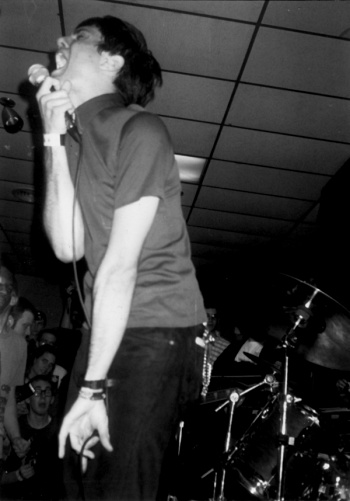
Talk to me a bit about the influences you guys shared from the onset. Your personal musical development has been documented well, but how about Jose, Eric, and John? Did they share a very similar path to what you all did in Swing Kids as yours?
At the time, I was not aware, or certainly didn’t want to be aware that we sounded a lot like Drive Like Jehu. Of course we all loved that band, who in their right mind didn’t. I also think musically we drew a bit from Shellac as well.
But again, I think the San Diego thing allowed us to be open to different things, and to not limit our intake and output in life. I think collectively we were all over the place, as far as influences.
Off the top of my head, we were drawing influence from anything like Moss Icon to Dave Weckl, and from Los Crudos to Napalm Death. And we were trying to align ourselves with bands like Mohinder and The VSS, and avoid a ton of stuff that we had mingled with previous to this.
It was a bummer to hear our friend [Ebullition Records, HeartattaCk founder] Kent McClard make fun of us and walk out of the room when Swing Kids played. But that was the fuel we needed to kist get more and more intense. The more interesting point to me though, was that being in San Diego, we were constantly exposed to the institutionally racist society that we all lived in.
Granted, Jose was the only person of color in the band, but we all lived in communities that were culturally diverse, and we already were fighting overtly racist people on all platforms.
So the political side of what Swing Kids was might not be as apparent in the lyrics or the art, or how we presented ourselves, but we were always conscious to play benefit shows that were political in nature, to try to speak to the audience about social politics, or have organizations table our shows that would showcase where out politics landed.
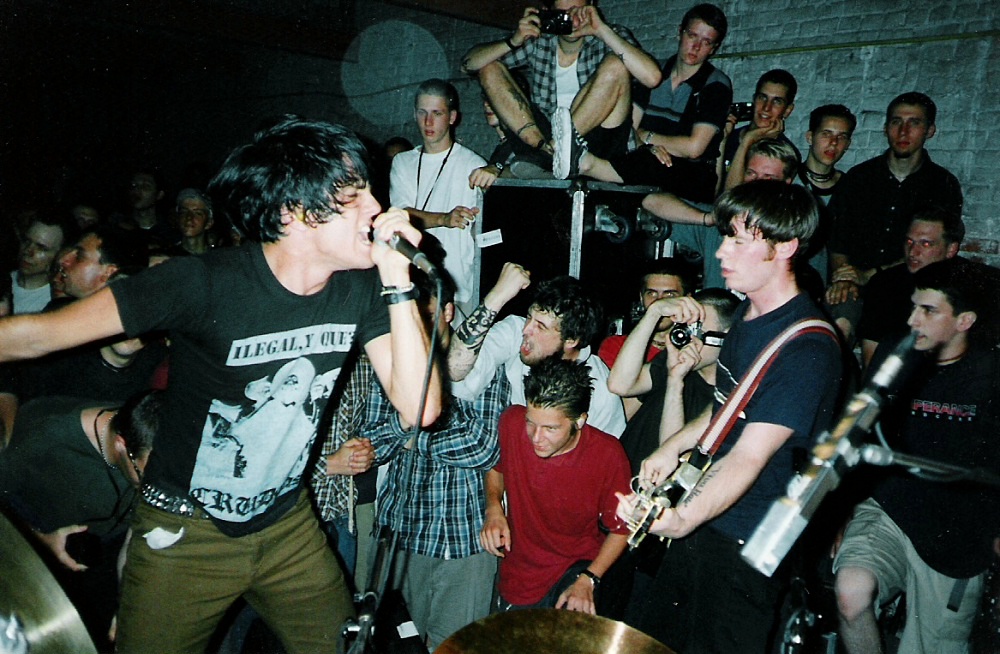
In retrospect, I think our influences that actually really made us who we were all were not musical. Those influences were social and political, which would lead us to musical. But what is more important to me to consider is now what I listened to, but why I listened to the stuff I did.
The San Diego punk community from that era was very forward-thinking, at least from a musical perspective. Did you see it that way, and how was Swing Kids received there once you started playing out and releasing music?
This is a very accurate perception in my opinion. I think a lot of what came out of the city was due to the fact that it is such a conservative place, and has this polished look to attract tourists and uphold this idea of what Southern California was supposed to be.
But in the city, you have always had the huge military influence, the tense border relations, and the class divisions that all really made daily life in San Diego something way more grim than a nice beach with palm trees and a sense. So without realizing it, we all had to take what we could get, and what we needed, we had to create on our own.
So you had shows at the Ché Café, where you could go see Heroin play with a three-piece jazz band and get all you can eat vegan spaghetti. Or you could see shows under the freeway in the sewers or onto of a parking structure where DIY films would be projected.
People were creative because we had to be, not only for survival but because it would not exist if we didn’t just figure out ways to do things on our own.
As far as being received, I think with Swing Kids, we were not really well received until we broke up. Part of that is due to the fact that we would tour with bands like Man Is the Bastard, Assuck, or Still Life, and not bands that were more like us.
But with that being said, the sheer hostility and hurdle with getting an audience to not be impartial, to at least despise us, was an important lesson and technique that I would end up using for the years to come all the way to this day.
Were there any misconceptions/dumb rumors you’ve heard about Swing Kids in all of the years you’ve traveled around the world touring that you’d like to address?
On a minute level, I remember trying to get Aaron Richards, who was one of the original guitarists for Antioch Arrow, to join Swing Kids but he kept refusing, saying we were too metal, and me trying to wrap my head around that since I had just come from playing in a metal band before Swing Kids. But it wasn’t until we split up where anyone really cared enough to talk about us.
There were issues with Eric passing away, where people assumed stuff, and would talk without caution not considering that we lost a loved one, but stuff like that is expected. And considering that he was also part of a straight edge band, that created issues in relation to Eric’s death, since he committed suicide by overdosing on prescription meds.
For me though, the real shit talking and rumors didn’t happen till I started playing in the Locust.
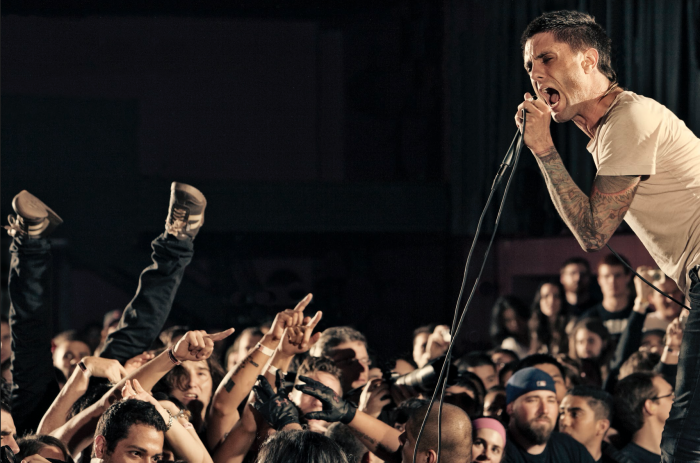
If you had to play one song that best encapsulates what Swing Kids was about to someone who has never heard the band before, which one would it be and why?
I think it would have to be “El Camino Car Crash." As much as I think I was the weak link in the band, that song musically is the most punctual track we had written. It was the last song we wrote with Eric, and even with my mediocre lyric writing and sub par vocals, the words had bite to them, and were just enough of a mix of obscurity, political aggression, and social consciousness.
But I think musically that track has the most musical tension of the songs we wrote, and that was always the goal that we had in mind when we were creating music.
***
Anthology is available for pre-order on both vinyl and digital via Three One G.
***
Donate a few bucks to help with No Echo's operating costs:
***
Tagged: swing kids

